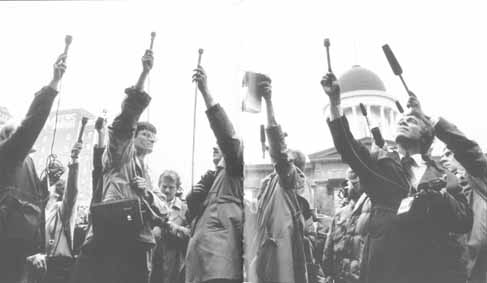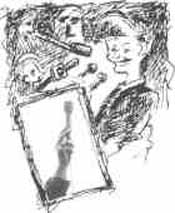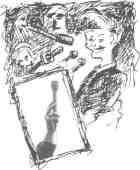Politics and the press HOW REPORTERS SOUR PUBLIC DEBATE ... AND HOW THEY CAN HELP MAKE DEMOCRACY WORK
Reviewed by Donald Sevener
Breaking the News: How the Media Undermine American Democracy,
News Values: Ideas for an Information Age,
The best newsman I know, who now devotes his time to defending the indefensible for a minor governor of a major state, has a fondness for sports metaphors, an uncanny intuition about the political nature of public people and clips that helped send state legislators to jail some years ago. Not the kind of reporter, in other words, that James Fallows would want in his newsroom. Fallows, who once wrote speeches for a minor president of a major country, is now the Washington editor of The Atlantic Monthly and author of Breaking the News: How the Media Undermine American Democracy, a mordant, and largely sound, censure of the practices and performance of the national press. He believes journalists waste too many words on personalities and politics at the expense of serious discussion of public policy, and he condemns their tendency to carry the ethos of the sports page into coverage of important national affairs. He is no fan of journalistic hardball. The fraternity's reaction to Fallows' attack has been mixed. Some reporters have praised his frank reproach in condemning superficial coverage of political campaigns and his willingness to name names in criticizing question- 18 ¦ August 1996 Illinois Issues able ethical practices. Others have fired back, particularly at his embrace of a controversial new approach to covering news known as "public journalism." Why does this matter? Because even most journalists are not satisfied with the way the press covers politics, campaigns, public affairs. As reporters gather in Chicago to cover Bill Clinton's renomination and in San Diego to report on Bob Dole's anointment, they too will debate what they do and why they do it. Many wonder, as does Fallows, how the media can shun "horse-race journalism" in favor of more thoughtful exploration of substantive issues. Many ask how the press can wean itself from a "sound bite mentality" and raise the level of political discourse. Many question how journalists can perform a credible role in an important democratic process. Fallows has some answers. And even if many journalists bristle at his critique and quaver at his ultimate solution, few could deny his conviction that the media can do better, and must. The indictment. Fallows minces few words. "The institution of journalism is not doing its job well Illinois Issues August 1996 ¦ 19
now," he states in his introduction. "It is irresponsible with its power. The damage has spread to the public life Americans all share." The sins are many: Journalists are out of touch. Fallows asserts that the national press operates as a big in-club, asking questions and reporting stories about the politics of public policy for fellow Washington insiders. The interests, concerns and problems of outsiders that is, the rest of us are ignored. "When ordinary citizens have a chance to pose questions to political leaders, they rarely ask about the game of politics. They mainly want to know how the reality of politics will affect them through taxes, programs, scholarship funds, wars." Journalists, on the other hand, "ask questions no one but their fellow professionals cares about." Journalists' obsession with crass politics not the substance of a crime bill, for instance, but the political advantages of looking tough on crime breeds cynicism toward the process of self-government. The "relentless emphasis on the cynical game of politics threatens public life itself," Fallows complains, "by implying day after day that the political sphere is mainly an arena in which ambitious politicians struggle for dominance, rather than a structure in which citizens can deal with worrisome collective problems." Television has harmed journalism. Television has harmed much of modern culture, but Fallows asserts its influence has damaged the news business by "altering the internal incentives of journalism." Reporters are accustomed to operating in the background of the story; TV reporters are celebrities whose luminance can overwhelm the story. The shift, Fallows notes, "from authority to celebrity in TV news was ratified in the 1970s, thanks largely to the effect of 60 Minutes. 60 Minutes changed TV journalism for one simple reason: It made money. ... It made news entertaining, by making it like everything else on TV." Entertaining, but not necessarily enlightening. Of the nearly 500 stories that 60 Minutes aired between 1990 and 1994, Fallows writes, "More than one-third were celebrity profiles, entertainment-industry stories, or exposes of what [author David] Halberstam called 'petty scandals.' Barely one-fifth of the stories concerned economics, the real workings of politics or any other issue of long-term national significance." Journalists are driven by a sports mentality to an obsession with conflict. "For American media in 1990s, public life is sports. The entire press has become the sports page," Fallows says, with overstatement that is all too characteristic. "Sports cannot exist without competition," he says. "But government and public life need not be a series of conflicts." The values of journalism. There is much in Fallows' analysis that rings true, despite his inclination to paint with an overly broad brush. But you can't help wondering whether Fallows has much understanding of or appreciation for the nature of the press its values and traditions, its biases and limitations. Though a fine journalist himself, Fallows' roots in journalism are not deep; he never dirtied his fingers with ink from papers literally hot off the press the way, say, Jack Fuller did. Fuller is publisher of the Chicago Tribune, where he has held several positions including reporter and editor; a novelist; a lawyer; a former Justice Department official and author most recently of News Values: Ideas for an Information Age. Fuller's roots are deep in journalistic tradition: He began his career as a police reporter for City News Bureau in Chicago, following in his father's footsteps. In contrast, Fallows is an alumnus of the Washington Monthly school of journalism, where he was among a series of youngish, Ivy League-educated, ex-government policy wonks who gathered in the '80s around Charles Peters, the Socrates of neo-liberalism, to learn the trade and then fan out to practice it at such respected magazines as The Atlantic, Newsweek, The New Republic, among others. In that milieu, it may be easy to forget a fundamental fact of journalism that is evident to editors and broadcast news producers every day: First and foremost, it's a business. Fuller: "Colonel McCormick used to shock students at Medill School of Journalism at Northwestern University by telling them that the first duty of a free press is to make a profit." What McCormick meant was that only a press that was economically sound could be editorially independent, two principles that often conflict. Though Fuller contends that the battle for "separation of church and state" the inviolable wall between newsroom and advertising department has been won, there are other influences that can undermine the independence of the press. The chief of those is audience. "The economic marketplace exerts uncompromising control," says Fuller. As he examines what makes news, 20 ¦ August 1996 Illinois Issues
Illinois Issues August 1996 ¦ 21 the newspaper may have to take the minority side. Or the community may be blind to the issue, and the newspaper will have to assault its complacency over the breakfast cereal day after day. In such circumstances, a newspaper that has already established its courage and outspokenness should be able to count on a large number of readers tolerating its ornery position, even if they are uncomfortable with it, because they expect this newspaper to take a stand." Fallows insists that the audience the public hungers for serious discussion of significant events; if you build better journalism, he avers, they will come. But the evidence suggests otherwise. Whose ratings are higher, Peter Jennings' or Robert MacNeil's? Howard Stern's or NPR's? Who sells more magazines, People or The New Yorker? Though both Fallows and Fuller claim the public enthusiasm for the raucous McLaughlin Group model of discourse is waning, that sentiment seems more like wishful thinking than supportable fact. Fallows notes that the influence of news consultants can be seen from coast to coast in the numbing sameness of TV news "from Boston to Seattle to San Antonio." Well, those "news doctors" aren't there promoting documentaries on the G7 summit; they are there to fix low ratings. Can Fallows possibly harbor hope for a medium whose culture is driven from the bottom up and that operates on the principle, in his words, "If it bleeds, it leads"? If serious journalism sold better, there would be more of it. Fine, but doesn't the First Amendment oblige the press to take seriously its role to inform the public? No, it doesn't. The First Amendment is often mistaken for a contract between the people and the press the guarantee of freedom of the press in exchange for a responsible role in self-government. But the First Amendment no more constrains the press to be responsible than the 15th, 19th and 26th amendments compel former slaves, women and 18-year-olds to vote. Fuller points out that nowhere in the First Amendment or other philosophical hosannas to freedom of speech that decorate the entrance to the Tribune Tower "will you find anything said about a duty owed by the press." And Fallows notes: "When the First Amendment to the Constitution was drafted, outlawing any restrictions on freedom of the press, the assumption was that newspapers would necessarily be partisan. Protecting the papers was a corollary of protecting free political organization. " The First Amendment is a right, not an obligation.
Nonetheless, Fuller argues, "What the law cannot impose ... the press should voluntarily accept. Newspaper people take satisfaction in noting that the future of newspapers and the future of self-government have a vital linkage." An organic institution. So what is the role of the press in the future of self-government? Fallows says the public wants a sense of connection to public life that escapes them when the media focus is riveted on personality, on political scheming, on entertaining rather than educating. His answer is the embrace of a nascent movement known as "public journalism," sometimes called "civic journalism." It is based on the concept, first articulated by John Dewey, that "those in charge of both the government and the press had a responsibility to figure out how to engage the entire public in the decisions that would affect them all in the long run." Under John Dewey's vision, the press should be an instrument like, say, the League of Women Voters, or in yesteryear the precinct committeeman, to advance the interest of democracy and the means of self-government. Civic journalism, Fallows says, is the recognition by journalists that they must take responsibility for the consequences of what they report. Civic journalism means many things, but one thing it means is that the media should take a more active role in defining campaign issues or setting a public agenda based on what the community says it wants. For example, the Charlotte Observer did extensive polling of North Carolina residents before the 1992 election and set up a 500-member citizens' advisory group to help the paper determine what issues voters wanted discussed the environmental consequence of Charlotte's sprawl, for one as opposed to what candidates planned to emphasize. The paper then focused its coverage and its questioning of candidates on the concerns voiced by the public. According to the Observer's editor, the approach smoked out the positions of one U.S. Senate candidate several months sooner by threatening to leave vacant the spaces in the newspaper where his environmental views were to appear. Seems like a small prize for such a high-falutin' aspiration. Civic journalism is highly controversial, principally among journalists who worry that it could erode the credibility of the media, which might be seen as advocating, rather than 22 ¦ August 1996 Illinois Issues objectively covering, an event, a cause or an agenda. Both Fallows and Fuller (and most practicing journalists) acknowledge that objectivity is a myth. Fuller: "No one has ever achieved objective journalism, and no one ever could. The bias of the observer always enters the picture, if not coloring the details at least guiding the choice of them." He says good journalists strive to "discipline themselves to correct against the bias." A greater risk of civic journalism and a much larger sin is that it could become an excuse for civic boosterism. Publishers, Jack Fuller excepted perhaps, are often all too eager to put their newspapers on the bandwagon of civic pride and be willingly dragged into promoting causes from the innocuous to the iniquitous. "Though journalists participate in the marketplace of ideas, their role is not an advocate's," says Fuller. "They act as surrogates who help the public discover and weigh the evidence. Their role should be more like the judge's than the lawyer's, more like the scholar's than the partisan's." Fuller seems intrigued by civic journalism, but treats it as an abstraction, deserving only passing notice. It is where Fallows and Fuller converge in their analysis that journalists can find the surest guidance to their role in the future of self-governance, though those looking for a textbook formula will be frustrated. The press has reinvented itself several times since Benjamin Harris' Publick Occurrences Both Forreign and Domestick was banished in 1690 for perceived offense to the British crown. From organs of party propaganda to the Penny Press, to Yellow Journalism, to the founding of the modern New York Times by Adolph Ochs, to the rise of radio and Edward R. Murrow, to the rise of television with Huntley-Brinkley, to the professionalization of the newsroom after World War II, the press in America has been an organic institution. Both Fuller and Fallows urge journalists to look anew at what they do. Though there is no need to redefine news, as Fallows would prefer, there certainly is ample cause for journalists to rethink how they look at the world. Fallows and Fuller both counsel reporters to shed the sneer, lose the attitude, drop the cynical pose. "We must resist the cynical impulse," Fuller writes. "News organizations must begin to exercise more self-control over their own darkest habits of thought." Both implore journalists to strive for what Fuller calls "coherence." People, he says, "want knowledge, not just facts or data." Journalism's real purpose, notes Fallows, "is to satisfy the general desire for information to have meaning." Fuller says the Tribune sums up its fundamental purpose with the motto: "Helping people master their world through knowledge," a phrase he says hearkens back "to a kind of old-time newspaper religion, one that believes that knowledge gives people power." EDITOR'S CHOICE
FEEDING FRENZY: HOW ATTACK JOURNALISM HAS TRANSFORMED AMERICAN POLITICS, by Larry J. Sabato (The Free Press, New York, 1991). Sabato, a scholar, argues that journalists do have obligations under the First Amendment: to inform citizens fully and to report with fairness and balance. He believes they're not keeping their end of the bargain. Reporters, he says, spend too much time chasing scandal of a purely private nature. Further, Sabato is alarmed by what he sees as a loosening of standards on the publication or broadcast of unproven rumor. "The press has become obsessed with gossip rather than governance; it prefers to employ titillation rather than scrutiny; as a result, its political coverage produces trivialization rather than enlightenment." Instead of winnowing the candidates, he says, that encourages cynicism. WHAT IT TAKES: THE WAY TO THE WHITE HOUSE, by Richard Ben Cramer (Random House, New York, 1992). Cramer, a Pulitzer Prize-winning journalist, wondered what would compel someone to believe they ought be president of the United States. Why would that person be willing to sacrifice privacy? What would drive someone to that point? He follows six contenders in the 1988 presidential sweepstakes including Bob Dole. (Hint: Dole's a workaholic.) INSIDE THE WIGWAM: CHICAGO PRESIDENTIAL CONVENTIONS 1860-1996, by R. Craig Sautter and Edward M. Burke (Wild Onion Books, Loyola Press, Chicago). Counting this year, the Windy City has played host to 25 political conventions. Sautter and Burke, a Chicago alderman and amateur historian, serve up the colorful details. And there's a foreword by Mayor Richard M. Daley. Illinois Issues August 1996 ¦ 23 |
|||||||||||||||||||




